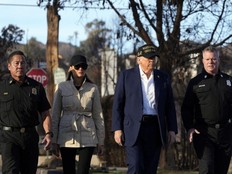Tesla profit plunges in latest quarter as Musk’s turn to politics repels buyers

Article content
NEW YORK — The fallout from Elon Musk’s plunge into politics a year ago is still hammering his Tesla business as both sales and profits dropped sharply again in the latest quarter.
The car company that has faced boycotts for months said Wednesday that revenue dropped 12% and profits slumped 16% in the three months through June as buyers continued to stay away.
“The perception of Elon Musk, its chief executive, has rubbed the sheen right out of what once was a darling and soaring automotive brand,” wrote Forrester analyst Dipanjan Chatterjee in an email. Tesla is “a toxic brand that is inseparable from its leader.”
Quarterly profits at the electric vehicle, battery and robotics company fell to $1.17 billion, or 33 cents a share, from $1.4 billion, or 40 cents a share. That was the third quarter in a row that profit dropped. On an adjusted basis, the company said it earned 40 cents a share, matching Wall Street estimates.
Revenue fell from $25.5 billion to $22.5 billion in the April through June period, slightly above Wall Street’s forecast.
Tesla shares fell 3% in after-hours trading.
Musk spent the company’s earnings conference call talking less about car sales and more about robotaxis, automated driving software and robotics, which he says is the future of the company. But those businesses are yet to take off, and the gap between promise and profit was apparent in the second quarter.
“It appears management’s focus will now shift to robotaxis and away from deliveries growth,” said Morningstar analyst Seth Goldstein, referring to car sales.
A big challenge is that potential buyers not just in the U.S. but Europe are still balking at buying Teslas. Musk alienated many in the market for cars in Great Britain, France, Germany and elsewhere by embracing far-right candidates for office on the continent. And rival electric vehicle makers such as China’s BYD and Germany’s Volkswagen have pounced on the weakness, stealing market share.
Tesla began a rollout of its paid pickup robotaxi service in Austin, Texas, and hopes to introduce the driverless cabs in several other cities soon. Musk has said he expects to have hundreds of thousands of the cabs on U.S. roads by the end of next year.
In the post-earnings call, Musk said the service will be available to probably “half of the population of the U.S. by the end of the year — that’s at least our goal, subject to regulatory approvals.
“We are being very cautious. We don’t want to take any chances.”
The test run in Austin has mostly gone off without a hitch, though there have been a few alarming incidents, such as when a robotaxi went down a lane meant for opposing traffic.
With autonomous taxis, though, the billionaire who upended the space race and the EV manufacturing faces tough competition. The dominant provider now, Waymo, is already in several cities and recently logged 10 million paid trips.
RECOMMENDED VIDEO
Meanwhile other threats loom. The new federal budget just passed by Congress eliminates a credit worth as much as $7,500 for buying an electric car. It also wipes out penalties for car makers to exceeding carbon emission standards. That threatens Tesla’s business of selling its “carbon credits” to traditional car companies that regularly fall short of emission standards.
Tesla generated $439 million from credit sales, down sharply from $890 million a year ago.
“We’re in this weird transition period where we’ll lose a lot of incentives in the U.S.,” Musk said, predicting several rough months possibly through June 2026. He added, though, “Once you get to autonomy at scale in the second half of next year, certainly by the end of next year, I would be surprised if Tesla’s economics are not very compelling.”
One way to boost sales that Musk mentioned while waiting for that future: A cheaper model. The company now is planning to introduce that to the market in the last three months of the year. Tesla had previously said that was going to happen by June this year.
Musk also said he expected regulatory approval to introduce its so-called Full Self-Driving software in some parts of Europe by the end of the year. Musk had previously expected that to happen by March of this year. The feature, which is available in the U.S., is a misnomer because it is only a driver assistance feature.
In the robot business, Musk said he expects explosive growth as Tesla ramps up production of its humanoid Optimus helpers to 100,000 a month in five years.
“We’ll go from a world where robots are rare to where they’re so common that you don’t even look up,” he said.
Asked about whether he would want more than his current 13% stake in Tesla to keep control, Musk said he did want more but not too much.
“I think my control over Tesla should be enough to ensure that it goes in a good direction,” he said, “but not so much control that I can’t be thrown out if I go crazy.”
Gross margins for the quarter, a measure of earnings for each dollar of revenue, fell to 17.2% from 18% a year earlier.
A highlight from the quarter was from something far removed from cars and robots: The company’s investment in bitcoin. That bet generated a $284-million paper gain, compared with a loss the previous quarter.













Postmedia is committed to maintaining a lively but civil forum for discussion. Please keep comments relevant and respectful. Comments may take up to an hour to appear on the site. You will receive an email if there is a reply to your comment, an update to a thread you follow or if a user you follow comments. Visit our Community Guidelines for more information.